 MyDogBreeds
MyDogBreeds Shikoku is originated from Japan but Beago is originated from United States. Shikoku may grow 14 cm / 5 inches shorter than Beago. Shikoku may weigh 35 kg / 78 pounds more than Beago. Both Shikoku and Beago has same life span. Shikoku may have less litter size than Beago. Both Shikoku and Beago requires Moderate maintenance.
Shikoku is originated from Japan but Beago is originated from United States. Shikoku may grow 14 cm / 5 inches shorter than Beago. Shikoku may weigh 35 kg / 78 pounds more than Beago. Both Shikoku and Beago has same life span. Shikoku may have less litter size than Beago. Both Shikoku and Beago requires Moderate maintenance.
 The Shikoku is from the Shikoku Island in Japan and they are very much like the Japanese Shiba Inu. There are six native Japanese dog breeds and the Shikoku is medium sized and sits in between the smaller Shiba Inu and the very large Akita Inu. All of the Japanese native breeds are members of the Spitz family. The Japanese have sorted their six breeds into 3 categories by size. Being medium size, the Shikoku is a member of the Shika-inus group. Others in this group are the Ainu Ken, the Kai Ken and the Kishu Inu. There are small differences between the three dogs in the Shika-inus group.
The Shikoku is from the Shikoku Island in Japan and they are very much like the Japanese Shiba Inu. There are six native Japanese dog breeds and the Shikoku is medium sized and sits in between the smaller Shiba Inu and the very large Akita Inu. All of the Japanese native breeds are members of the Spitz family. The Japanese have sorted their six breeds into 3 categories by size. Being medium size, the Shikoku is a member of the Shika-inus group. Others in this group are the Ainu Ken, the Kai Ken and the Kishu Inu. There are small differences between the three dogs in the Shika-inus group.
The Shikoku was bred to be a hunting dog in Kochi Prefecture to hunt boar and deer. Other names for the breed include Kochi-ken and Kishu dog or boar hound. This dog is considered to be the purest of the Japanese native dogs or Nihoken. They are today very , very rare. There are very few outsides of Japan, but some in North America are attempting to save the breed.
The are od Kochi Prefecture is a mountainous region with rough terrain that anyone outside of the area would have a hard time accessing. That is why the Shikoku is considered to be so pure as they were pretty well isolated in the mountains. The breeders were also isolated by the mountains and there was very little interbreeding. Although breeding the same dog, these different groups developed different lines of the Shikoku.
Documentation tells us that the number of originals lines was just two and these were the Western and Eastern Shikoku. The Western dog was known as the Mount Ishizuchi Shikoku and the Eastern as the Mount Tsurugi Shikoku. Within these two lines of Shikoku there are additional strains.
Within the Eastern line there is the Tokushima (lya) and the Koci-Aki strains. Within the Western line there is the Hata Uwahara, the Ehime-ken Shuso-gun and the Honkawa. Among these lines and strains, there are different coats and different colors; some heavier and some taller, but all figure into the development of the breed.
Finally, in the Showa Era the Japanese established the Dog Protective League and they began collecting the native dogs from around the country. They protected them so that the breed will go on. The Shikoku is today recognized as Foundation Stock by the AKC and it is fully recognized by the Japan Kennel Club, the Canadian Hound Club and the Shikoku has been declared a living Japanese “natural monument”.
Two bloodlines became the way the Shikoku were know after the war – the Honkawa and the Hata lines The Honkawa line were the descendants of the Choshun-go and the Hata line were the descendants of the Matsukaze-go. They bred the lines separately until 1955, when they mixed them to make the breed stronger. They are no longer considered separate in any way.
Because they are such primitive dogs, the Shikoku are good watch dogs and quite reserved with strangers. They need a lot of socialization to be a family pet but once they are, they make great companions. Intelligent, quick to learn and eager to please. Of the two lines of Shikoku dogs from the Western strains, the current Shikoku owes much of its current development to the Honkawa and Hata strains.
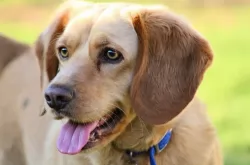 Made up of two purebred dog breeds, the Beagle and the Golden Retriever, Beago is kind of new breed. Some say that they were bred on purpose during the 1980s, in a desire to create a smart and loving dog that will be a smaller size than the Golden Retriever since this will make them ideal for indoor life.
Made up of two purebred dog breeds, the Beagle and the Golden Retriever, Beago is kind of new breed. Some say that they were bred on purpose during the 1980s, in a desire to create a smart and loving dog that will be a smaller size than the Golden Retriever since this will make them ideal for indoor life.
 Today’s Shikoku is a medium sized breed with a Spitz like body – square with a head that is wedge shaped. The ears are pointed, and the tail is curved and feathered. They have arched toes and hard pads with dark, hard nails.
Today’s Shikoku is a medium sized breed with a Spitz like body – square with a head that is wedge shaped. The ears are pointed, and the tail is curved and feathered. They have arched toes and hard pads with dark, hard nails.
The two lines of the Shikoku are slightly different in built and look. The Honkawa strain is slender and athletic; agile and single coated. They have dark eyes and most of them are black and tan.
On the other hand, the Hata strain is much heavier boned, with the front more muscular than the rear. They have small ears, a wide skull and a strong undercoat. His eyes are shaped differently than the Honkawa. Their coats are also mostly red and tan.
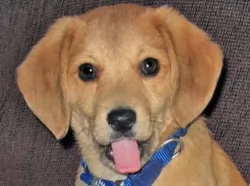 Beago is a medium-sized dog with a usually tri-coloured coat that can vary in some colours. They have usually short hairs because sometimes happens that they have longer hairs if the Golden retriever genes are stronger. Their hairs are soft to the touch and they don’t shed a lot and that makes them easy to maintain. They have dark coloured eyes, floppy ears, and they have the body shape of the Beagle, but they are very active and muscular like the Golden Retriever.
Beago is a medium-sized dog with a usually tri-coloured coat that can vary in some colours. They have usually short hairs because sometimes happens that they have longer hairs if the Golden retriever genes are stronger. Their hairs are soft to the touch and they don’t shed a lot and that makes them easy to maintain. They have dark coloured eyes, floppy ears, and they have the body shape of the Beagle, but they are very active and muscular like the Golden Retriever.
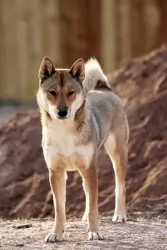 1.Children friendliness – They might be a little aloof with children. They are hunters.
1.Children friendliness – They might be a little aloof with children. They are hunters.
3.Adaptability with your commitment to exercise they can live anywhere even in an apartment.
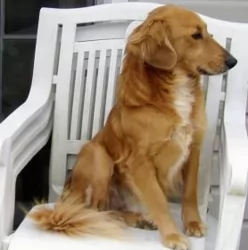 They are very good with children of all age.
They are very good with children of all age.
Hunting, search, rescue dog, agility competitions.
Beago will love living in a house with a bog yard. As well, he will have a happy life in the apartments as long as you take him out for his daily activity. They get along with other pets, so any other dog or cat will be great company for him. They are usually well mannered in public places, if you train them and socialize, but they will always bark if there is someone strange in your house. They are very good with children of all age.
Beage is very smart breed. They will pick up new tricks very quickly and remember it forever. They would love learning new tricks once you include treats as rewards, but you must be careful not to overfeed him.
 Being isolated as they were, the Shikoku was a fairly healthy breed, no genetic testing has been done. Despite this they suffer a few of the same potential issues as other breeds their size.
Being isolated as they were, the Shikoku was a fairly healthy breed, no genetic testing has been done. Despite this they suffer a few of the same potential issues as other breeds their size.
Otherwise this is an agile and hardy breed with no known congenital health issues.
 There are no general health issues with this breed. The health history shows that they have common health problems as any other active dog – problems with hips and elbows. Because of their floppy ears, they are prone to infections and diseases caused by lack of ear hygiene. Some of them have skin allergies. The best advice is always to make regular vet checks. Then you and your Beago can live a happy and long life.
There are no general health issues with this breed. The health history shows that they have common health problems as any other active dog – problems with hips and elbows. Because of their floppy ears, they are prone to infections and diseases caused by lack of ear hygiene. Some of them have skin allergies. The best advice is always to make regular vet checks. Then you and your Beago can live a happy and long life.
 Feeding the puppy Be careful with feeding the puppy and adult as the breed is known to have a tendency toward obesity. Fresh food is better as it is what the breed has been used to, but a high quality puppy kibble is acceptable. Feed three times per day.
Feeding the puppy Be careful with feeding the puppy and adult as the breed is known to have a tendency toward obesity. Fresh food is better as it is what the breed has been used to, but a high quality puppy kibble is acceptable. Feed three times per day.
2.Feeding the adult He is a high energy dog so feed a high energy food designed for a medium sized dog. Feed in two meals each day.
4. Games and Exercises You will need a fenced yard for this breed and time to play with them. If not, you would need time to walk her more than once a day. They love to play indoors as well, chasing balls, learning new things. The breed make great companions for hiking, swimming, play frisbee or catch outside. They do well at agility, rally, obedience and flyball.
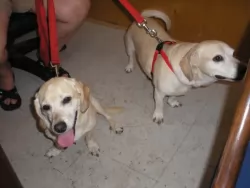 The best tip is to feed them with quality dry food. Canned food can be given once in week or less. They will love cheese and meat in their meal. Since they like to munch, they will eat almost any raw fruit or vegetables. Until you Beago is six months old, feed him tree time per day. Keep the feeding schedule unchanged to form a habit and avoid problems with metabolism.
The best tip is to feed them with quality dry food. Canned food can be given once in week or less. They will love cheese and meat in their meal. Since they like to munch, they will eat almost any raw fruit or vegetables. Until you Beago is six months old, feed him tree time per day. Keep the feeding schedule unchanged to form a habit and avoid problems with metabolism.
Since they don’t shed a lot, grooming your Beago will be easy. They won’t need an everyday brush, but it will be good if you could brush him two times per week and bathe once in a month. Their floppy ears need regular care as well. They need to be cleaned with the ear cleaning solution at least once a week. They will need regular nail trimming as well. They need quality food because they are very active dogs. Make sure not to overfeed them. Daily activity is a must.
Beago is very active breed. They like to spend time outdoors, running, playing fetch, jumping. They will love visiting the dog park or any park that is close to your house. They are very good if taken hiking.